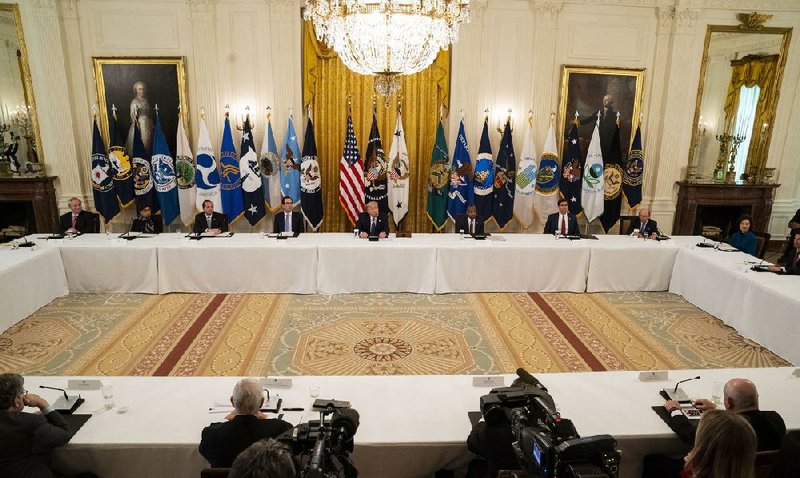WASHINGTON -- President Donald Trump defended himself Tuesday against criticism from medical experts that his announced use of a malaria drug against the coronavirus could spark wide misuse by Americans of the unproven treatment with potentially fatal side effects.
Trump's revelation a day earlier that he was taking hydroxychloroquine caught many in his administration by surprise.
He asserted that a study of veterans that raised alarm about the drug was "false" and an "enemy statement," even as his own government warned that the drug should be administered for covid-19 only in a hospital or research setting.
[Video not showing up above? Click here to watch » https://www.youtube.com/watch?v=pGprvdJFY4U]
"If you look at the one survey, the only bad survey, they were giving it to people that were in very bad shape," Trump said. That was an apparent reference to a study of hundreds of patients treated by the Department of Veterans Affairs in which more of those in a group who were administered hydroxychloroquine died than among those who weren't.
"They were very old, almost dead," Trump said. "It was a Trump enemy statement."
During a Cabinet meeting, he elicited a defense of his practice from other officials, including VA Secretary Robert Wilkie, who noted that the study in question was not conducted by his agency.
However, two large observational studies, each involving about 1,400 patients in New York, recently found no benefit from hydroxychloroquine in fighting the coronavirus. Two new ones published last week in the medical journal BMJ reached the same conclusion.
Trump said he decided to take hydroxychloroquine after two White House staffers tested positive for the disease caused by the coronavirus, but he already had spent months promoting the drug as a potential cure or preventive measure despite the cautionary advice of many of his administration's top medical professionals.
"This is an individual decision to make," Trump told reporters during a visit to Capitol Hill to meet with Senate Republicans. He later claimed, "It's gotten a bad reputation only because I'm promoting it."
Many studies are testing hydroxychloroquine, but "at this point in time, there's absolutely no evidence that this strategy works," said Dr. Carlos del Rio, an infectious-disease specialist at Emory University in Atlanta.
"My concern is, the president has a big bully pulpit. ... Maybe people will think there's some non-public evidence" that the drug works because Trump has chosen to use it, del Rio said. "It creates this conspiracy theory that something works and they're not telling me about it yet."
Addressing concerns that Trump's example could lead people to misuse the drug, White House press secretary Kayleigh McEnany said that "tens of millions of people around the world have used this drug for other purposes," including malaria prophylaxis.
The drug is also prescribed for some lupus and arthritis patients.
Fox News Channel anchor Neil Cavuto, who has multiple sclerosis and other health issues, called Trump's admission stunning. He warned viewers in vulnerable health that they could face serious consequences if they followed the president's example.
"This is a leap that that should not be taken casually by those watching at home or assuming, well, the president of the United States says it's OK," Cavuto said.
[CORONAVIRUS: Click here for our complete coverage » arkansasonline.com/coronavirus]
Cavuto said he was trying "not to make a political point here, but a life and death point. Be very, very careful."
Trump said his doctor did not recommend hydroxychloroquine to him, but that he requested it from the White House physician.
That physician, Dr. Sean Conley, said in a statement that, after "numerous discussions" with Trump, "we concluded the potential benefit from treatment outweighed the relative risks."
The Food and Drug Administration warned health professionals in April that the drug should not be used to treat covid-19 outside hospital or research settings because of sometimes-fatal side effects.
Trump dismissed reports of side effects, saying: "What has been determined is it doesn't harm you. Very powerful drug, I guess, but it doesn't harm you."
Trump also lashed back at House Speaker Nancy Pelosi, calling her a "sick woman" who has "a lot of mental problems," after she had questioned Trump's use of the drug because he is 73 and had falsely labeled him as "morbidly obese."
Information for this article was contributed by Zeke Miller, Marilynn Marchione, Jonathan Lemire, Matthew Perrone, Will Weissert and Darlene Superville of The Associated Press; and by Josh Wingrove of Bloomberg News.
A Section on 05/20/2020
